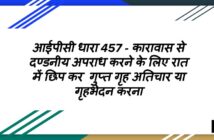Ever noticed someone hiding in a place to commit an offence? Do you know what kind of offence it is and what punishment it has? It is a lurking house trespass, one of the aggravated forms of criminal trespass. We have already discussed house trespass in our previous article. In this article, we will discuss what is lurking house trespass, its essential ingredients, what is housebreaking, what is the punishment for lurking house trespass, whether is it bailable or not, and what is the difference between lurking house trespass by night and housebreaking.
IPC Section 457 – What is lurking house trespass?
Chapter 17, Of Offences against the property under Section 443 of the Indian Penal Code, 1860 (IPC) deals with lurking house-trespass.
If a person commits house-trespass by taking precautions to conceal or hide such trespass from the person who has the right to eject or exclude such trespasser from the place being trespassed, namely; building, vessel, or tent, then such person is said to have committed an offence of lurking house-trespass.
The Supreme Court in Nasiruddin Vs the State of Assam, 1971 defined lurking house-trespass as when an accused takes active means to hide or conceal their presence or escape notice.
In all lurking house-trespass, there should be a house trespass, which requires entry into or remaining in the building, vessel, or tent.
Lokesh Kumar Vs State (NCT of Delhi) and Another, 2016
In this case, the Complainant contended that the house door was locked by him before going out and when he returned from outside, he found that the balcony’s door was open. When the complainant ran towards the balcony, he saw someone jumping out of the balcony and running away. The person was booked under Section 443 of IPC.
The court had held that to make a person liable under Section 443 of IPC, the trespasser must try to conceal the house-trespass from the person who has the right to eject or exclude the trespasser. However, in this case, the accused did not make any attempt to take any precaution to conceal the house-trespass, therefore, the offence of lurking house-trespass cannot be established.
Essential ingredients of lurking house-trespass
To establish an offence of lurking house-trespass, there should contain the following essential ingredients –
- The trespasser should attempt to take precautions to conceal or hide such trespass;
- The trespass should be made in a surreptitious manner, i.e., lurking;
- The trespass should be deliberately concealed from the owner or occupant of the property;
- The owner or the occupant of the property should have the right to eject or exclude the entrance of the trespasser.
- The offender should take precautions to conceal house trespass before the commission of house trespass. If the person conceals house-trespass after seeing the occupant or owner of the house, then they cannot be said to have committed lurking house-trespass. (Buddha Vs Emperor, 1916)
- The house-trespass or house-breaking should be made to commit an offence.
What is lurking house-trespass by night?
Section 444 of the IPC states that when a person commits lurking house-trespass after sunset but before sunrise, then such a person is said to have committed lurking house-trespass by night. The punishment for lurking house-trespass by night is provided under Section 456 of IPC.
What is housebreaking?
Section 445 of the IPC deals with housebreaking. If a person commits house-trespass by entering into the house or any part of it for committing an offence or quits the house or any part after committing an offence, by using any of the six ways namely; passage made by themselves or any abettor, scaling or climbing over any building or wall, passage which the occupier is not aware to remain open, opening any lock, using criminal force or committing or threatening to commit assault to enter or depart, fasten or unfasten through any passage. Then such a person is said to have committed housebreaking. The punishment for the offence of housebreaking is provided under Section 456 of IPC.
For the purpose of this section ‘any part of the house’ means any outhouse or a building that is connected with the house, and in between such houses there is an internal space.
What is Section 457 of the IPC?
As per Section 457 of the IPC, if a person commits lurking house-trespass by night or house-breaking by night, to commit any offence which is punishable with imprisonment, then such person will be liable for up to five years of imprisonment of either description and with a fine. If such a person intends to commit theft, then, the term of imprisonment may extend to fourteen years.
To attract punishment under Section 457 of IPC there must be the following ingredients –
- Occurrence of house-trespass or house-breaking,
- Deliberately concealing their presence or entrance into the house;
- The offence of lurking house-trespass or house-breaking should be committed to committing any offence which is punishable with imprisonment;
- The offence of lurking house-trespass or house-breaking could also take place for committing theft.
Is Section 457 of IPC bailable or not?
Section 457 of the IPC is a cognizable and non-bailable offence that is triable by the Magistrate of First Class. An offence under Section 457 of IPC is a non-compoundable offence.
What is the punishment for lurking house trespass?
The punishment for lurking house trespass has been provided under Section 453 – 460 of the IPC. The punishment varies depending on the intensity of the offence.
Section 453 of IPC – If a person commits an offence of lurking house-trespass or house-breaking then, such person will be liable for up to two years imprisonment of either description and with a fine.
Section 454 of IPC – If a person commits lurking house-trespass or house-breaking to commit any offence which is punishable with up to three years of imprisonment of either description and with a fine. The imprisonment would be extended to ten years if a such person intends to commit theft.
Section 455 of IPC – If a person commits lurking house-trespass or house-breaking, by making some arrangement for causing or intimidating a person to cause hurt assault or wrongful restraint, then such person will be liable for imprisonment of either description for up to ten years and with a fine.
Section 456 of IPC – If a person commits lurking house-trespass by night or house-breaking by night, then in such case, the person will be liable for up to three years of imprisonment of either description and also a fine.
Section 457 of IPC – Punishment for lurking house-trespass or house-breaking by night for the purpose of committing any offence, then the punishment would be five years imprisonment of either description and a fine, however, if the person intends to commit theft then the punishment would increase to fourteen years of imprisonment of either description.
Section 458 of IPC – If a person commits lurking house-trespass or house-breaking by night by making some arrangement for causing or intimidating a person to cause hurt assault or wrongful restraint, then such person will be liable for imprisonment of either description for up to fourteen years and with a fine.
Section 459 of the IPC – Where a person while committing lurking house-trespass or house-breaking causes or attempts to cause death or grievous hurt to another person then such person will be liable for imprisonment for life or up to ten years of imprisonment and a fine.
Section 460 of IPC – When at the time of committing an offence of lurking house-trespass or house-breaking by night, the person found guilty of such offence, voluntarily either causes or attempts to cause grievous hurt or death of a person, then, every person who is jointly concerned or involved in the commission of such offence will be punished with imprisonment for life or up to ten years of imprisonment of either description and a fine.
What is the difference between lurking house trespass by night and house breaking?
House trespass is an aggravated form of criminal trespass which is punishable depending on the gravity of the offence. Lurking house trespass by night and housebreaking is a form of house trespass which is originated from criminal trespass and differs from each other on the following criteria –
- The major difference between lurking house trespass by night is that there has to be house trespass by concealing their presence at night. Whereas, in housebreaking, the house-trespass should take place by entering through any six ways specified in the section.
- Lurking house trespass by night takes place after sunset and before sunrise, whereas house breaking can take place at any time of the day.
- In lurking house trespass by night the entry is made surreptitiously, whereas in house breaking the entry is made violently without taking any precaution to conceal their presence.
Conclusion
Every owner of the property has the right to eject or exclude another person from entering their property without their permission. And if a person enters into the property by taking precautions to conceal their presence or identity from the owner or occupier of the property who has the right to eject or exclude such person’s entrance. Then such a person is said to have committed lurking house trespass. Punishment for lurking of house trespass by night is provided under Section 457. It is a non-bailable, cognizable, and non-compoundable offence, which is triable by the Magistrate of First Class. Lurking house-trespass by night is different from house breaking as it involves entrance or departure in any of six specified ways for the purpose of committing an offence and the accused does not conceal their identity from the occupier of the property.


